Powerball Jackpot the Fourth-Largest Lottery Prize in US History, Here’s What To Do if You Win
Posted on: October 9, 2023, 07:59h.
Last updated on: October 9, 2023, 10:07h.
Tonight’s Powerball jackpot is an estimated $1.55 billion, with a one-time cash option of $679.8 million.
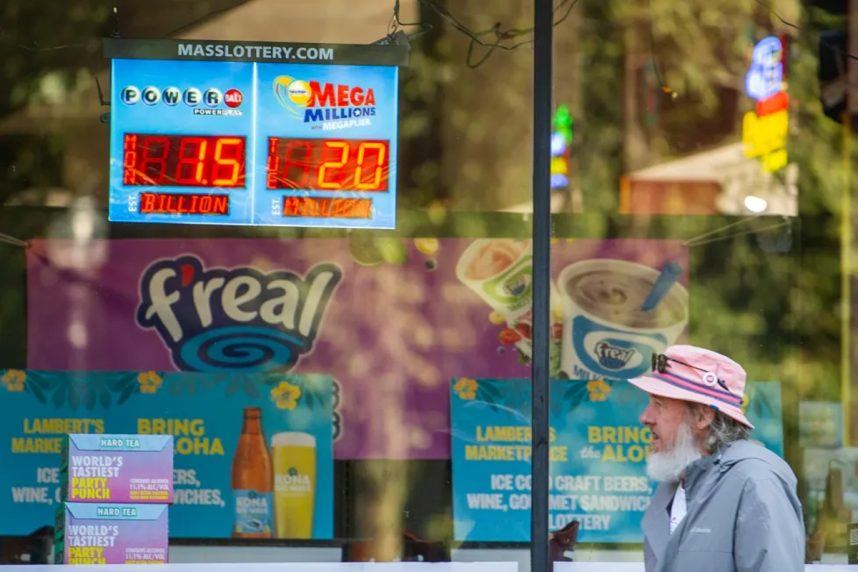
The odds of a Powerball ticket matching the six drawn numbers remain constant at just one in 292.2 million. But the chances of a drawing returning a jackpot winner presumably increase in probability when the jackpot climbs to unimaginable wealth, as the immense prizes fuel additional sales that result in more possible number combinations being covered.
Despite the increased play over the past two weeks as the Powerball jackpot climbed towards and eventually eclipsed the 10-digit mark, the interstate lottery game has gone 34 straight drawings without a single ticket matching the five white balls and the red Powerball.
Each Powerball play begins at $2, with most states providing players with an optional $1 add-on Powerball Play multiplier that can double, triple, quadruple, quintuple, or decuple (10x) their prize. Some states like Pennsylvania also provide Powerball players with a supplemental “Double Play” choice where another six numbers are drawn. However, that drawing only allows players to win up to $10 million — not the advertised Powerball jackpot.
Powerball is played in 45 states, plus DC, Puerto Rico, and the US Virgin Islands. The Double Play option is offered in 17 states plus the nation’s capital.
Financial Advisors Urge Winner to Consult Expert
At $1.55 billion, tonight’s Powerball jackpot is the third-largest in the game’s history and the fourth-largest lottery prize in the history of the United States.
Powerball holds the all-time US lottery record, a $2.04 billion prize won last November by a lucky player in California. Mega Millions’ record jackpot of $1.6 billion won in August of this year is second. A Powerball jackpot of $1.586 billion won in January 2016 by three tickets sold in California, Florida, and Tennessee is third.
If a ticket hits the six numbers tonight, financial advisors recommend that the winner(s) consult with a wealth manager and possibly an attorney to redeem their life-changing payout. Financial advisors say winners who choose the annuity gain longevity in their financial security since the winnings aren’t paid out all at once.
Most people take the lump sum, because they want the money, they want to control it,” said Robert Pagliarini, president and chief financial advisor for Pacifica Wealth Advisors and author of The Sudden Wealth Solution, told Nexstar. “I honestly think most people are probably better off taking the annuity.”
Financial managers say the 30-year distribution is considerably more attractive than the one-time cash because the Effective Federal Funds Rate (EFFR) is 5.33%.
The Federal interest rate is used to determine the full advertised jackpot payout since bonds issued by the US Treasury back the annuity. With interest high, the annuity has climbed much quicker during the Powerball run than it would have only a couple of years ago when the Federal rate was at or near zero.
Feds Guaranteed Winner
While the odds of winning the Powerball jackpot are dismal, they’re a sure thing for the US federal government. That’s because whoever wins the generation-changing wealth will be subjected to a bounty of federal income taxes.
The US government’s top tax bracket on the country’s highest income earners is an effective rate of 37%. That means if a ticket wins tonight’s jackpot and the winner opts for the cash, the $679.8 million would be immediately reduced by $251.4 million. That would leave the winner with approximately $428.3 million, which would then be subjected to possible state taxes.
Only California, Delaware, Florida, New Hampshire, Puerto Rico, South Dakota, Tennessee, Texas, Washington, and Wyoming do not tax lottery wins.
Related News Articles
$1.35B Mega Millions Winner Comes Forward in Maine, Picks One-Time Cash Option
Powerball Climbs to Third-Largest Jackpot in Game History
Mega Millions Jackpot Winner Claims Prize, but Florida Law Keeps Details Hidden
Most Popular
LOST VEGAS: ‘Tony The Ant’ Spilotro’s Circus Circus Gift Shop
Casinos That Were Never Casinos
Most Commented
-
End of the Line for Las Vegas Monorail
— April 5, 2024 — 90 Comments -
Cracks Emerging on Las Vegas Strip Says Analyst
— April 30, 2024 — 14 Comments -
Mega Millions Reportedly Mulling Substantial Ticket Price Increase
— April 16, 2024 — 9 Comments
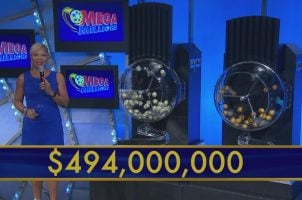

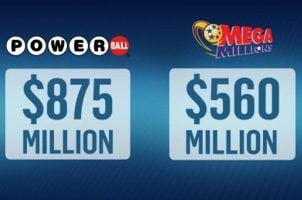
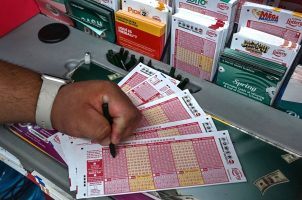











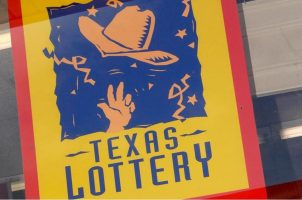
No comments yet